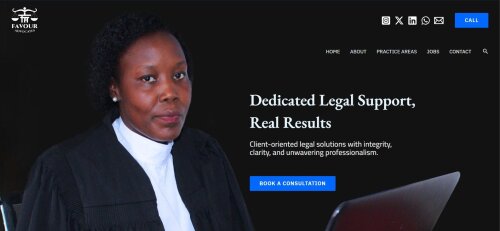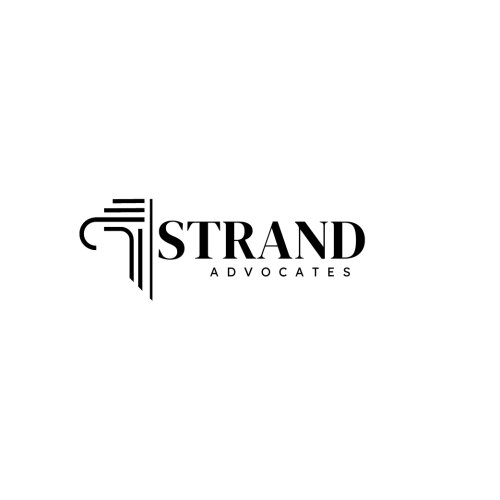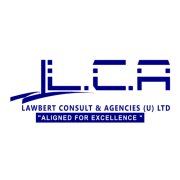Best Guardianship Lawyers in Kampala
Share your needs with us, get contacted by law firms.
Free. Takes 2 min.
List of the best lawyers in Kampala, Uganda
About Guardianship Law in Kampala, Uganda
Guardianship laws in Kampala, and Uganda at large, are mostly regulated by the Children (Amendment) Act of 2016 and The Guardianship and Custody of Infants Act of 1964. Courts are responsible for appointing a guardian when they perceive a need to protect the minor’s interests. These laws protect the wellbeing of a child by ensuring they receive adequate necessary care, love, and protection, especially when parents are absent, deceased or unable to care for the child.
Why You May Need a Lawyer
Legal intervention is often required in guardianship cases. You may need a lawyer in situations such as a dispute over guardianship rights, establishing a guardianship, amending or terminating a guardianship. An attorney is also useful in providing advice and assistance about the responsibilities and legal obligations that come with guardianship. Furthermore, if you are a guardian facing allegations of neglect or breach of duty, you certainly need legal representation.
Local Laws Overview
The Children (Amendment) Act of Uganda provides that the best interests of the child should be paramount in all decisions concerning the child. It also establishes strict requirements for those seeking guardianship. Such individuals or couples must commit to the child’s upbringing including his/her education, health, and welfare until they turn eighteen. The person must also prove that alternatives such as adoption, foster care, or care within the child’s wider family aren’t feasible. The Guardianship and Custody of Infants Act give courts the right to make custody decisions based on the welfare of the child.
Frequently Asked Questions
1. Who can apply for guardianship?
Any person who has attained the age of majority (18 years) and has the capacity to contract can apply for guardianship, as long as the court deems it in the best interest of the child.
2. How long does the guardianship process take?
The process can take several months, depending on the specific case. It involves filing a petition, assessment, and a court hearing.
3. Can a guardianship be revoked?
Yes, a guardianship can be revoked if the court determines it's in the child's best interest, usually in cases of abuse, neglect, or capability of the natural parents to cater for the child.
4. What responsibilities does a guardian have?
Guardians are responsible for the child’s general welfare, including education, healthcare, and emotional well-being. They should make decisions in the child's best interest.
5. Does a guardian have the same rights as a parent?
A guardian does not have the exact same rights as a biological or adoptive parent, though they are legally responsible for the care and management of the child or the child's property.
Additional Resources
The Ministry of Gender, Labour and Social Development offers various programs and initiatives aimed at protecting children’s rights. The Uganda Law Society also provides legal resources and assistance. Local non-profit organizations and children's rights groups can provide advice and support as well.
Next Steps
If you need legal assistance in guardianship, you should consult with a legal professional experienced in this area of law. Consider gathering all necessary documents such as the child's birth certificate, any relevant court orders, and financial records. Remember to prepare a list of queries or concerns prior to your legal consultation to have a clear view of your situation.
Lawzana helps you find the best lawyers and law firms in Kampala through a curated and pre-screened list of qualified legal professionals. Our platform offers rankings and detailed profiles of attorneys and law firms, allowing you to compare based on practice areas, including Guardianship, experience, and client feedback.
Each profile includes a description of the firm's areas of practice, client reviews, team members and partners, year of establishment, spoken languages, office locations, contact information, social media presence, and any published articles or resources. Most firms on our platform speak English and are experienced in both local and international legal matters.
Get a quote from top-rated law firms in Kampala, Uganda — quickly, securely, and without unnecessary hassle.
Disclaimer:
The information provided on this page is for general informational purposes only and does not constitute legal advice. While we strive to ensure the accuracy and relevance of the content, legal information may change over time, and interpretations of the law can vary. You should always consult with a qualified legal professional for advice specific to your situation.
We disclaim all liability for actions taken or not taken based on the content of this page. If you believe any information is incorrect or outdated, please contact us, and we will review and update it where appropriate.














